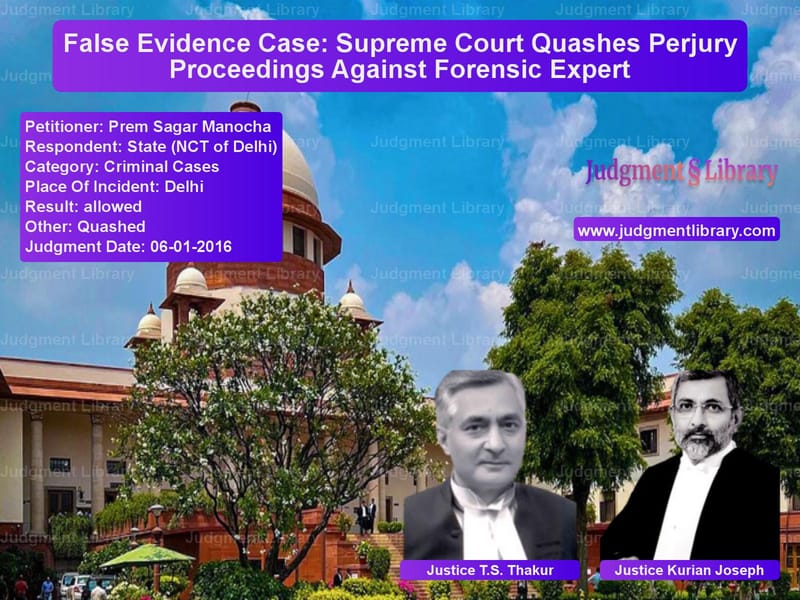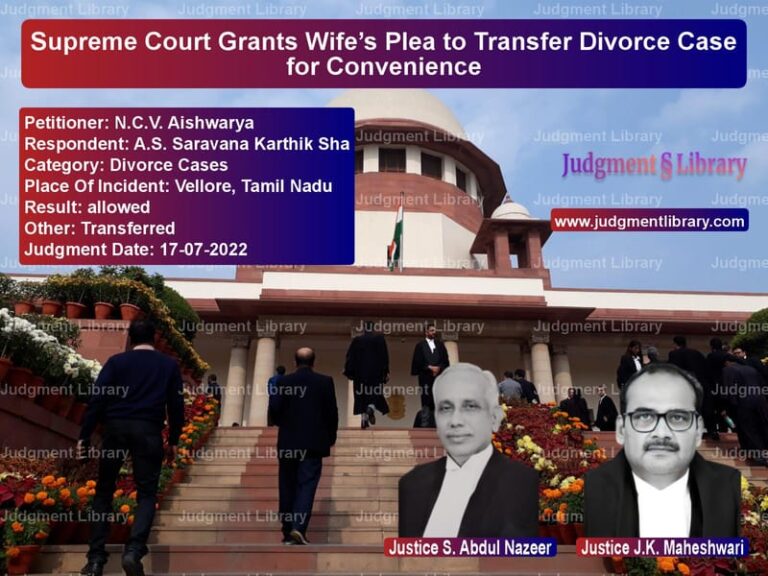False Evidence Case: Supreme Court Quashes Perjury Proceedings Against Forensic Expert
The case of Prem Sagar Manocha v. State (NCT of Delhi) is a significant ruling where the Supreme Court quashed the perjury proceedings initiated against a forensic expert under Section 340 of the Code of Criminal Procedure (CrPC). The expert, who had provided ballistic evidence in the high-profile Jessica Lal murder case, was accused of giving false evidence. The Supreme Court ruled that there was no material evidence to prove intentional perjury, reinforcing the principle that expert opinions should not be criminalized based on differing conclusions.
Background of the Case
The case stemmed from the Jessica Lal murder case (FIR No. 287 of 1999) registered at Police Station, Mehrauli. The forensic opinion of the appellant, Prem Sagar Manocha, was sought to analyze:
- The caliber of two empty cartridges recovered from the crime scene.
- Whether the cartridges were fired from a pistol or a revolver.
- Whether the two cartridges were fired from the same firearm.
The appellant, then serving as the Deputy Director of the State Forensic Science Laboratory, Rajasthan, submitted a report on February 4, 2000, stating:
- The caliber of the two cartridge cases was .22.
- The cartridges appeared to have been fired from a pistol.
- No definite opinion could be given about whether they were fired from the same firearm, unless the suspected firearm was examined.
Testimony in Court and Perjury Allegation
During the trial, the appellant testified as PW-95. The trial court acquitted the accused in 2006, but the High Court reversed the decision, convicting the accused. The Supreme Court upheld the conviction in 2010 in the case of Sidhartha Vashisht @ Manu Sharma v. State (NCT of Delhi) [(2010) 6 SCC 1].
The High Court, disturbed by the large number of prosecution witnesses turning hostile, initiated suo motu proceedings under Section 340 CrPC against 32 witnesses, including the appellant. While proceedings against some were dropped, the High Court found that the appellant’s oral evidence deviated from his written forensic report, allegedly helping the accused.
Alleged Contradiction in Expert Opinion
The High Court highlighted a discrepancy in the expert’s report and his oral testimony:
- In the forensic report, the expert stated that a conclusive opinion about whether the two cartridges were fired from the same firearm could not be given without examining the firearm.
- During trial, he responded to a court query, stating that the two cartridges appeared to have been fired from two different firearms.
- The High Court held that this shift in stance supported the “two-weapon theory,” allegedly favoring the defense.
Appeal Before the Supreme Court
The appellant challenged the High Court’s order before the Supreme Court, arguing:
- His forensic opinion remained consistent throughout, and his oral testimony only provided an expert assessment based on available evidence.
- His response in court was given under insistence from the trial judge, and he had maintained that a definitive opinion could only be given if the firearm was examined.
- There was no deliberate falsehood or fabrication of evidence.
Supreme Court’s Analysis and Judgment
1. Expert Opinion Cannot Be Criminalized
The Supreme Court ruled:
“An expert provides an opinion based on scientific methodology. A difference in interpretation does not constitute perjury.”
The Court emphasized that an expert’s duty is to assist the court with professional knowledge and that criminalizing expert testimony could have a chilling effect on forensic investigations.
2. Lack of Mens Rea (Intent to Deceive)
The Court held that perjury under Section 193 IPC requires intentional falsehood:
“The appellant’s report and oral testimony were consistent in stating that a definite conclusion could only be reached if the firearm was examined. His expert assessment, even if different from prosecution expectations, does not prove intentional perjury.”
3. Section 340 CrPC: No Justification for Criminal Proceedings
The Court analyzed the scope of Section 340 CrPC and held:
“The provision is meant to protect the administration of justice, not to punish professionals for differences in expert opinion.”
The Court ruled that invoking Section 340 CrPC against the expert was unjustified.
4. Expert Testimony Is Not Conclusive Evidence
The Court reaffirmed that forensic opinions are advisory and subject to judicial scrutiny. It cited State (Delhi) v. Pali Ram [(1979) 2 SCC 158], stating:
“An expert’s evidence is only confirmatory or explanatory; it cannot override other evidence unless it is the sole basis of conviction.”
Final Judgment
The Supreme Court quashed the perjury proceedings and ruled:
- The proceedings under Section 340 CrPC against the appellant were quashed.
- There was no basis to prosecute the forensic expert.
- The expert had acted within his professional limits, and his testimony did not constitute intentional falsehood.
Key Takeaways
- Expert opinions should not be criminalized for differing from prosecution expectations.
- Perjury requires intentional falsehood, which was absent in this case.
- Section 340 CrPC should be used cautiously and not against professionals performing their duties.
- Judicial interpretation of forensic evidence should remain independent.
Conclusion
The judgment in Prem Sagar Manocha v. State (NCT of Delhi) is a crucial ruling for forensic professionals and expert witnesses. It upholds the principle that scientific interpretations may vary but do not amount to perjury. The Supreme Court’s ruling ensures that expert testimony remains a credible and integral part of the justice system, free from undue prosecution.
Don’t miss out on the full details! Download the complete judgment in PDF format below and gain valuable insights instantly!
Download Judgment: Prem Sagar Manocha vs State (NCT of Delhi) Supreme Court of India Judgment Dated 06-01-2016.pdf
Direct Downlaod Judgment: Direct downlaod this Judgment
See all petitions in Fraud and Forgery
See all petitions in Custodial Deaths and Police Misconduct
See all petitions in Judgment by T.S. Thakur
See all petitions in Judgment by Kurian Joseph
See all petitions in allowed
See all petitions in Quashed
See all petitions in supreme court of India judgments January 2016
See all petitions in 2016 judgments
See all posts in Criminal Cases Category
See all allowed petitions in Criminal Cases Category
See all Dismissed petitions in Criminal Cases Category
See all partially allowed petitions in Criminal Cases Category







